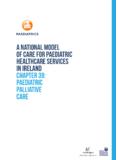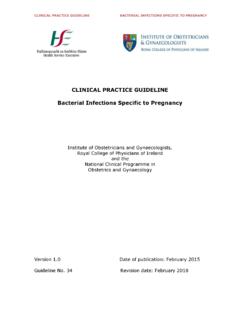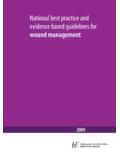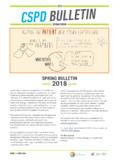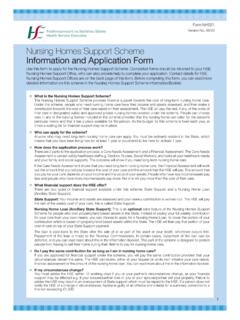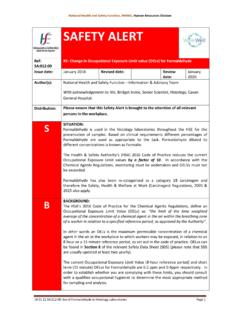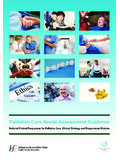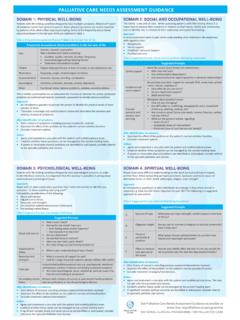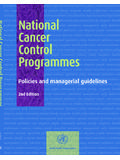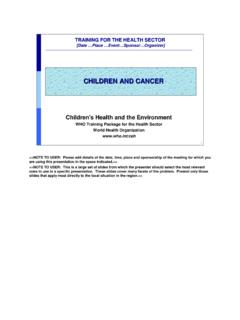Transcription of Extravasation Classification of Systemic Anti …
1 Extravasation Classification of Systemic anti - cancer Therapy Background Document June 2017 Background Drugs used in Systemic anti cancer Therapy (SACT) particularly cytotoxics, can be extremely irritating and cause damage if they extravasate or infiltrate into surrounding tissues during intravenous administration. Extravasation refers to the inadvertent infiltration of any liquid (fluid or drug) from a vein into the subcutaneous or subdermal tissues during intravenous administration1.
2 Depending on the type, Extravasation can result in damage to the tissues, cause pain, erythema, swelling and blistering. If left undiagnosed or inappropriately treated, this can lead to necrosis, secondary infection and functional loss of the tissue or possible permanent damage to the limb involved2 Management of an Extravasation depends on which drug has accidentally leaked into the tissues. Therefore, it is vital that the Classification of the drug is known in order to direct the management of the Extravasation .
3 Currently, most hospital delivering HSE funded SACT services maintain their own Extravasation Classification lists and there are some variations between hospitals. The introduction of the Medical Oncology Clinical Information System (MOCIS) presents a potential opportunity to implement a series of standardised documents for inclusion within the MOCIS configuration. The NCCP has developed a standardised nursing document for the assessment of a suspected or diagnosed Extravasation injury and an accompanying list of Extravasation drug classifications for use in Irish hospitals and if possible, for inclusion within the MOCIS configuration.
4 The Extravasation Classification list is based on current International evidence3 The NCCP Extravasation Classification list (Appendix 1) will classify parenteral SACT into four different types depending on their ability to cause local damage after Extravasation . These categories should be implemented in all future Extravasation recording documentation and electronic systems where possible. Vesicants DNA Binding Vesicants Non DNA Binding Irritants Neutrals (Non vesicants) As per the NCCP Oncology Medication Safety Review Report4, each hospital is required to have a policy governing the prevention, recognition and treatment of Extravasation .
5 This should be developed in line with local practices and incorporate references to the documentation as described above. This Document was circulated to all hospital CEOs and General Managers , relevant stakeholders and made available on the NCCP website All comments and feedback are welcome at 1 Fidalgo , et al. Management of chemotherapy Extravasation : ESMO-EONS Clinical Practice Guidelines. Annals of Oncology 2012; 23: 167-173. 2 NHS East Midlands. Guidelines for Management of Extravasation , 2015 3 Quicklinks table, eviQ Extravasation Management, 2016.
6 , Extravasation Guidelines Implementation Toolkit, EONS 2007., Management of chemotherapy Extravasation : ESMO-EONS Clinical Practice Guidelines, Chemotherapy Extravasation guideline, WOSCAN 2009., Assessment, Prevention & Management of Extravasation of Cytotoxic Medications GONG cancer Care Guidelines 2009., Extravasation policy for all drugs, chemotherapy & non chemotherapy, NHS Tayside, 2008.,Poilcy for the Treatment of Extravasation Injury, NHS, Avon, Somerset and Wiltshire 2012.
7 , Guideline for Management of Extravasation , NHS East Midland, 2015., Extravasation Hazard Table, BCCA 2014., Guidelines on Treatment of Extravasation with Cytotoxic Drugs, NHS Thames Valley 2014., Policy on the Management of Extravasation , Network Site Specific Group 2016., Extravasation injury from chemotherapy and other non-antineoplastic vesicants, UpToDate 2017., cancer Care Ontario Drug Formulary. 4 Heckmann P, McCarthy T, Walsh O, Hanan T. NCCP Oncology Medication Safety Review Report. 2014. Appendix 1.
8 Extravasation Classification of Systemic anti - cancer Therapy 1 Vesicants Vesicants DNA Binding Vesicants Non DNA Binding Amsacrine Epirubicin Paclitaxel Vinblastine Bendamustine Idarubicin Paclitaxel NAB Vincristine Carmustine Mechlorethamine Vindesine Dactinomycin Mitoxantrone Vinorelbine Daunorubicin Mitomycin C Doxorubicin Trabectedin Irritants Arsenic trioxide Cisplatin Flourouracil Streptozocin Azacitidine Dacarbazine Gemtuzumab Ozogamicin Teniposide Bortezomib Docetaxel Ifosfamide Temsozolomide Busulfan Liposomal Daunrubicin Irinotecan Topotecan Cabazitaxel Liposomal Doxorubicin Melphalan Trastuzumab Emtansine (Kadcyla)
9 Carboplatin Etoposide Oxaliplatin Non Vesicants/Neutrals Aldesleukin Cladribine Mifamurtide Pixantrone Asparaginase Clofarabine Nivolumab Raltitrexed Alemtuzumab Cytarabine Nelarabine Ruxolitinib Aflibercept Daratumumab Obinutuzumab Rituximab Amifostine Decitabine Ofatumumab Siltuximab Bevacizumab Eribulin Panitumumab Temsirolimus Brentuximab vedotin Fludarabine Pegaspargase Trastuzumab (Herceptin) Bleomycin Gemcitabine Pemetrexed Thiotepa Carfilzomib Ipilimumab Pentostatin Cetuximab Interferons Pembrolizumab Cyclophosphamide Methotrexate Pertuzumab All comments and feedback are welcomed at This document is based on internationally accepted guidance on the Extravasation Classification of drugs.
10 Any clinician seeking to apply or consult these documents is expected to use independent medical judgement in the context of individual clinical circumstances to determine any patient's care or treatment. Please refer to local hospital Extravasation policy for more details on the treatment of Extravasation Extravasation Classifications of Systemic anti cancer Therapy Version 1 Publish date: 21/06/2017 Review Date: 21/06/2019 NCCP CODE: 00010 1 This information is valid only on the day of printing, for any updates please check
